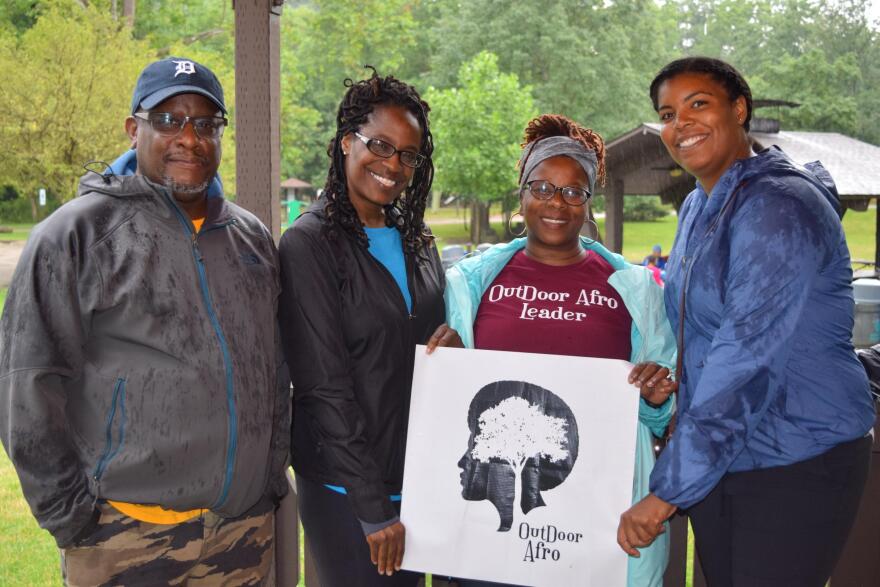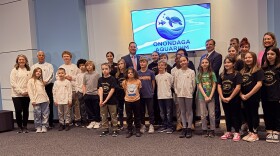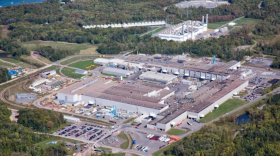When you think of the environmental movement, what comes to mind. Preserving the wilderness at national parks? Or guaranteeing safe drinking water in a city? The movement is reaching out for new issues and new people – especially minorities.
I meet Kim Smith-Woodford on a rainy day at Euclid Creek Reservation east of Cleveland. It’s a big wooded area, with a trail along the creek and shelters for birthday parties. Folks from all backgrounds come to this urban oasis.
The park means a lot to Smith-Woodford. It’s where she became more interested in the outdoors.
“One day I noticed that I saw a couple of people walking in the woods, and those people didn’t look like me,” she recalls. “I thought, 'Well, why are they walking over there?'”
The people were walking on the dirt trail – and one day, Smith-Woodford decided she could, too.
“It was just a beautiful thing to walk, and hear the chipmunks running and scampering around,” she says. “I’ve had sightings of deer, and I think I even saw a turkey!”
Last year, she started Cleveland’s Outdoor Afro group, part of a nationwide program that has one overarching goal: get people of color – mainly African-Americans – outside. The group hikes, swims, and kayaks on Lake Erie.
Outdoor Afro stands out in a movement that hasn’t always been the most welcoming to people of color.
The environmental movement started more than 100 years ago, with a focus on preserving the wilderness. The cause was aimed at Americans who could afford to travel to distant places -- national parks like Yosemite and Yellowstone.
“When the U.S. environmental movement went out to protect any place and space, it’s often from perspective of middle class, predominantly white consumers,” said Aaron Mair. He was the Sierra Club’s first black president; his two-year term recently ended.
He got involved with the movement through environmental justice, a term coined in the 1980s.
That focuses on injustice – like the hazardous waste sites and polluting factories located in many minority communities.
Environmental justice got much more visibility in 2014, when the drinking water supply in Flint, Mich., was contaminated with lead. Thousands of residents were exposed, and many children tested positive for lead poisoning.
The media seized on the crisis, and one TV newscast blared: “Families in Flint file a federal lawsuit over the city’s water crisis -- they claim the water made them sick.”
Jumana Vasi, who funded Great Lakes environmental work at the Mott Foundation before leaving in June, sees Flint as a turning point for mainstream groups.
“Drinking water infrastructure was very invisible for a very long time until the Flint drinking water crisis happened, but that is Great Lakes water flowing through the City of Flint, flowing through Detroit, Milwaukee, Cleveland,” she says.
And as Flint pushed groups to look outward and re-evaluate the issues they supported, another moment in 2014 forced them to look inward.
Just a couple of months after the Flint water switch, a group called Green 2.0 released a report on diversity at environmental organizations. It showed that only 16 percent of staffers were people of color.
For Joel Brammeier, president of the Alliance for the Great Lakes, “it was a real wake-up call to many folks in the environmental community that there’s a real gap here.”
The Alliance has been hosting community conversations – especially in Cleveland, using residents’ perspectives to guide the group’s work.
But there are still gaps when it comes to embracing diversity, according to research by the University of Michigan’s Dr. Dorceta Taylor.
On her surveys, some people in environmental groups said a focus on non-traditional issues is “unnecessary”. Or that diversity leads to “unintentional discrimination”.
Mair says the environmental mission must be broadened, especially as blacks, Latinos and other minorities make up more of the country’s population.
“If you don’t bring in all perspectives and if you don’t include all of America in this movement, this environmental movement, you doom the cause and you doom the outcome,” he says.
Mair says time is running out. The world is becoming more diverse -- and the movement needs to catch up.







